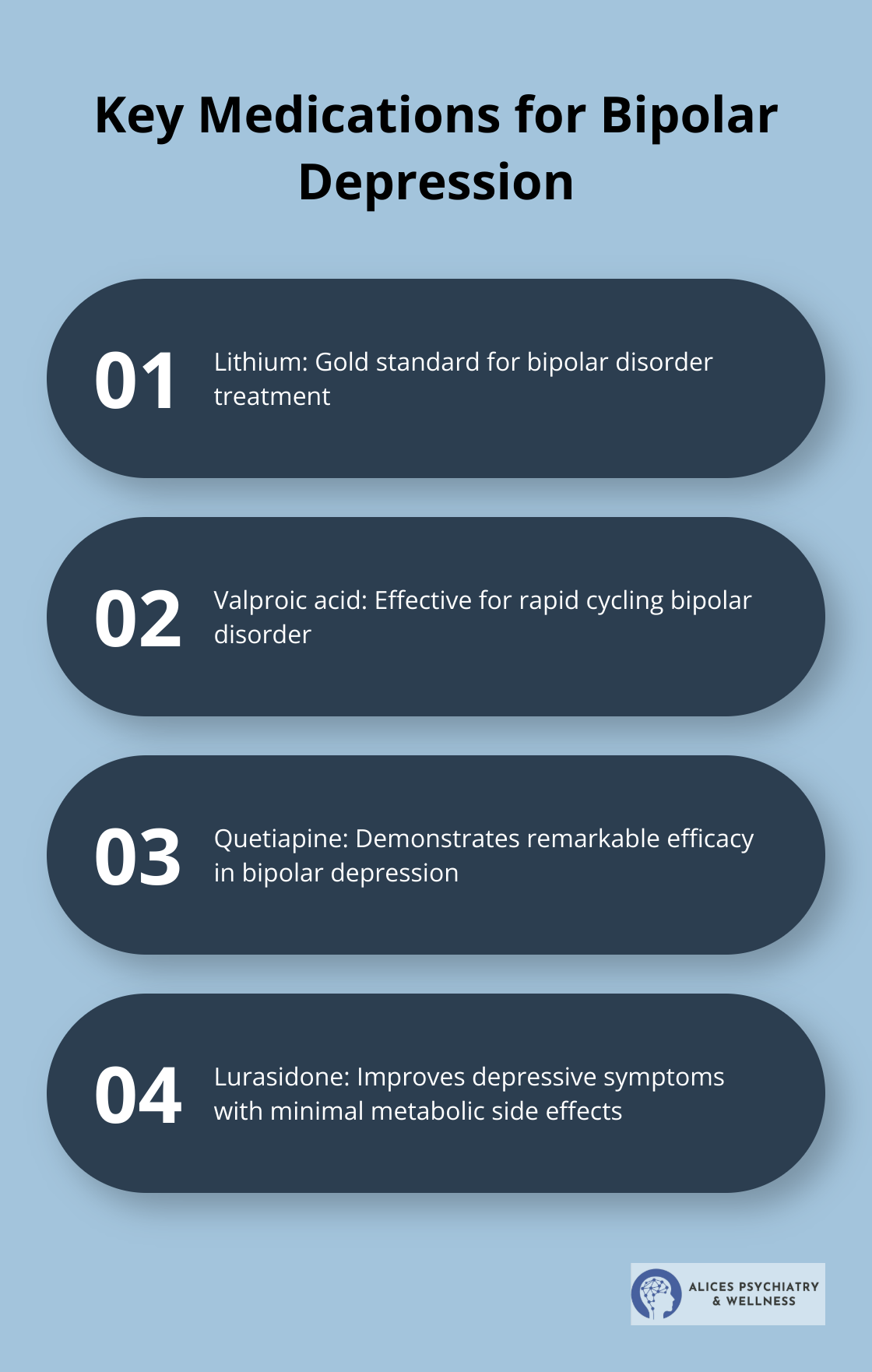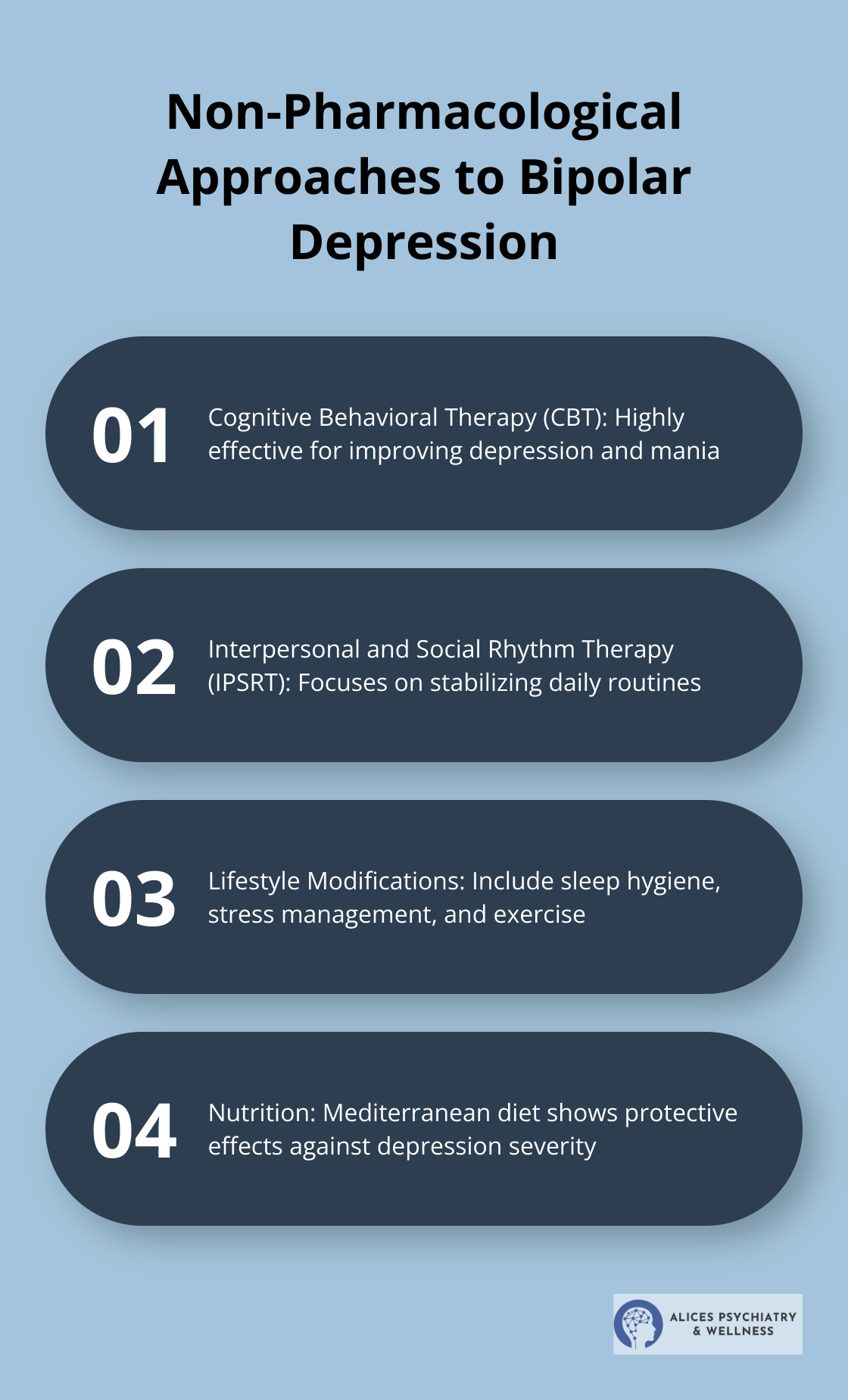Bipolar depression is a complex and challenging condition that requires careful management. At Alice’s Psychiatry and Wellness, we understand the importance of effective first-line treatments for bipolar depression.
This blog post explores the various pharmacological and non-pharmacological options available to patients and healthcare providers. We’ll discuss how these treatments can be tailored to individual needs, helping those with bipolar depression find relief and stability.
What Is Bipolar Depression?
Definition and Characteristics
Bipolar disorder affects a significant number of adolescents and young adults globally, with an increasing incidence rate. This complex mental health condition forms part of bipolar disorder, which involves alternating periods of depression and mania (or hypomania). Unlike unipolar depression, bipolar depression presents unique challenges in diagnosis and treatment.
Recognizing the Signs
The depressive phase of bipolar disorder manifests through several symptoms:
- Prolonged sadness
- Hopelessness
- Loss of interest in previously enjoyed activities
- Changes in sleep patterns
- Appetite fluctuations
- Difficulty concentrating
- Thoughts of death or suicide
These symptoms can vary in intensity and duration from person to person. Some individuals may experience hypersomnia (excessive sleep) and increased appetite, which contrasts with the insomnia and decreased appetite often seen in unipolar depression.
The Challenge of Accurate Diagnosis
Misdiagnosis poses a significant concern in bipolar depression. A UK study found that 15% of people diagnosed with major depressive disorder (MDD) did not meet the criteria for MDD or any mood disorder, while 30% had undetected bipolar disorder. This statistic underscores the need for thorough evaluation and accurate diagnosis.

Comprehensive assessment techniques (such as detailed patient histories and symptom tracking) help ensure an accurate diagnosis. Some clinics also use advanced tools like pharmacogenetic testing to guide treatment decisions.
Differentiating Bipolar from Unipolar Depression
The distinction between bipolar and unipolar depression presents a key challenge in diagnosis. While symptoms may appear similar, subtle differences exist:
- Symptom presentation: Bipolar depression often involves hypersomnia and increased appetite, while unipolar depression typically features insomnia and decreased appetite.
- Course of illness: Bipolar depression follows a more episodic pattern, with periods of normal mood or elevated mood (mania or hypomania) between depressive episodes. Unipolar depression lacks these manic or hypomanic periods.
Understanding these distinctions proves essential for effective treatment. Misdiagnosing bipolar depression as unipolar depression can lead to inappropriate treatment strategies, potentially triggering manic episodes or worsening the overall course of the illness.
As we move forward, we’ll explore the first-line treatment options available for managing bipolar depression, including both pharmacological and non-pharmacological approaches.
Effective Medications for Bipolar Depression
At Alice’s Psychiatry and Wellness, we recognize the complexities involved in treating bipolar depression. Pharmacological interventions form a cornerstone in managing symptoms and stabilizing mood. Let’s explore the most effective medication options available.
Mood Stabilizers: The Foundation of Treatment
Lithium stands as the gold standard for bipolar disorder treatment. Numerous observational studies suggest that lithium may prevent suicide and suicide attempts in patients with bipolar disorder or depression. We typically initiate treatment with a low dose, gradually increasing to find the optimal therapeutic level.
Valproic acid serves as another potent mood stabilizer. It proves particularly effective for rapid cycling bipolar disorder. However, it necessitates careful liver function monitoring.
Atypical Antipsychotics: A Powerful Addition
Quetiapine demonstrates remarkable efficacy in bipolar depression. We often prescribe it at bedtime due to its sedating effects.
Lurasidone offers another excellent option, especially for patients concerned about weight gain. It improves depressive symptoms with minimal metabolic side effects. Patients often report improved cognitive function with this medication.
Combination Therapies: Enhancing Treatment Outcomes
The combination of mood stabilizers with atypical antipsychotics can yield highly effective results. However, combination therapies require careful monitoring. Regular blood tests and dosage adjustments help minimize side effects while maximizing benefits.

Tailoring Treatment to Individual Needs
Pharmacogenetic testing guides our medication choices at Alice’s Psychiatry and Wellness. Pharmacogenomic guided medication enhances remission and response rates. This advanced approach allows us to predict how a patient might respond to different medications based on their genetic makeup, potentially reducing the trial-and-error process.
We also consider factors such as pregnancy plans, comorbid conditions, and potential drug interactions when selecting medications. For example, we typically avoid valproic acid in women of childbearing age due to its potential teratogenic effects.
While medications play a vital role in treatment, they work best when combined with psychotherapy and lifestyle modifications. Our next section will explore these non-pharmacological approaches to managing bipolar depression, providing a comprehensive view of effective treatment strategies.
Beyond Medication: Holistic Approaches to Bipolar Depression
The Power of Psychotherapy
Cognitive Behavioral Therapy (CBT) stands out as a highly effective treatment for bipolar depression. Studies show variable results in improving the level of depression and the severity of mania, improving functionality, reducing relapses and recurrences.
Interpersonal and Social Rhythm Therapy (IPSRT) is another powerful tool. This therapy focuses on stabilizing daily routines and improving interpersonal relationships.

Lifestyle Modifications: Small Changes, Big Impact
Sleep hygiene is paramount in managing bipolar depression. Irregular sleep patterns can trigger mood episodes. Establishing consistent sleep schedules and creating bedtime routines can significantly improve sleep quality. Simple changes like avoiding screens before bed and maintaining a cool, dark sleeping environment often yield positive results.
Stress management techniques also play a vital role. Mindfulness meditation, for instance, has shown to reduce depressive symptoms in some studies. Various stress-reduction techniques (such as deep breathing exercises and progressive muscle relaxation) can provide significant benefits.
Exercise is another powerful tool. Try to incorporate at least 30 minutes of moderate exercise into your daily routine.
The Role of Support Systems
Strong support systems can make a significant difference in managing bipolar depression. Family-focused therapy, which involves educating family members about the condition and improving communication, has shown to reduce relapse rates.
Support groups also play a vital role. Connecting with others who share similar experiences can reduce feelings of isolation and provide practical coping strategies.
Nutrition and Bipolar Depression
Diet plays a significant role in mental health. The Mediterranean diet provides protective effects against the severity of depression and bipolar disorder.
Developing nutritional strategies that support mental health can be beneficial. This might include increasing intake of omega-3 fatty acids, which have shown to have mood-stabilizing effects, or reducing consumption of processed foods and sugars, which can exacerbate mood swings.
Final Thoughts
First-line treatment for bipolar depression combines pharmacological and non-pharmacological interventions. Mood stabilizers and atypical antipsychotics effectively manage symptoms, while psychotherapy and lifestyle modifications promote long-term stability. Personalization is key to successful treatment, with factors such as genetic makeup and individual preferences influencing the most effective approach.
Ongoing communication with healthcare providers ensures optimal management of bipolar depression. Regular check-ins allow for timely adjustments to treatment plans as circumstances change. Patients should feel empowered to discuss their experiences, concerns, and goals with their healthcare team.
Alice’s Psychiatry and Wellness specializes in personalized care for individuals with bipolar depression. We offer comprehensive evaluations and advanced testing methods (including pharmacogenetic testing) to provide effective and tailored treatment. Our team is ready to support you on your journey towards wellness and stability.





